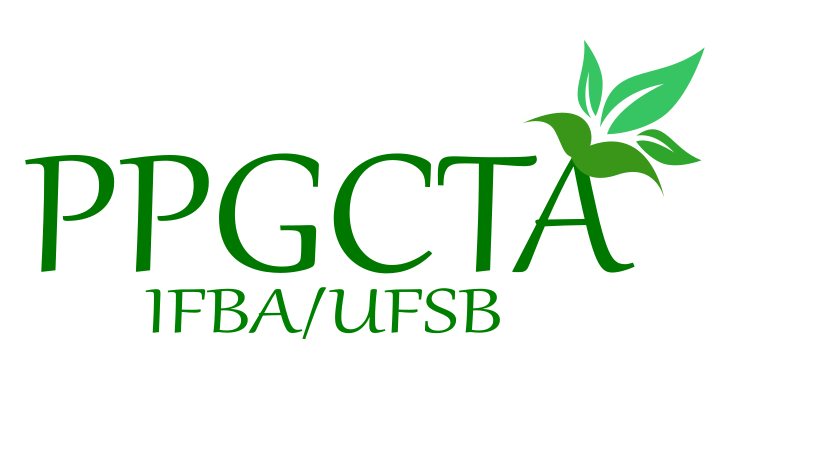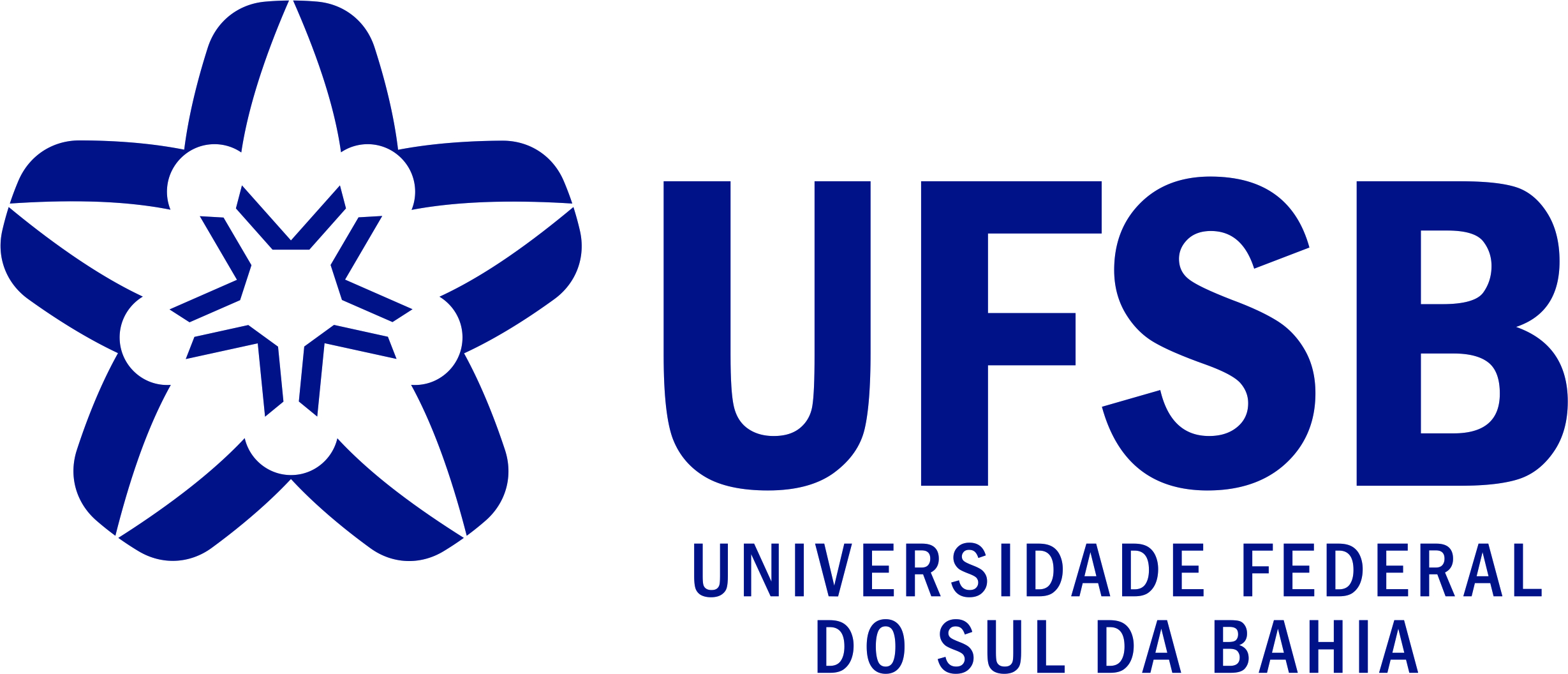Graduate Program in Environmental Science & Technology

H I G H L I G H T S
If you need any further information or help with language,
please do not hesitate to contact us at ppgcta@ufsb.edu.br or ppgcta.psg@ifba.edu.br
Defense and Qualification Meetings
Presentation

The Stricto Sensu Graduate Program in Environmental Science & Technology (PPGCTA) is a program shared between the Federal University of Southern Bahia (UFSB) and the Federal Institute of Education, Science and Technology of Bahia (IFBA), and aims to train high-level human resources with technical and scientific abilities in the areas of Environmental Sciences and Technologies.
The consolidation of research at UFSB and IFBA, in Porto Seguro, has led to a non-negotiable commitment to sustainability and a strong concern for the preservation of socio-environmental diversity in the areas surrounding these institutions, as well as with their socio-environmental conflicts.
Thus, with complementary objectives and actions in the Southern Bahia region, the IFBA - Porto Seguro Campus and the UFSB – Sosígenes Costa Campus in Porto Seguro have gathered human resources and infrastructure to create, establish and consolidate a graduate program in Environmental Sciences.


Program Statement
The PPGCTA aims to generate human resources to: promote knowledge about the structure and functioning of natural ecosystems; manage the environment through sustainable strategies; encourage the use and application of legal mechanisms that favor environmental sustainability; and use innovative technology to resolve environmental problems.
The objectives combine and require a multidisciplinary approach that emphasizes the performance of this program and, therefore, reflects its area of concentration and the three lines of research that, despite their approaches, converge to understand, manage and solve fundamental environmental problems for environmental sustainability.
Main Area: Environmental Science & Technology
Research Lines:
Natural and Anthropogenic Systems
Objectives: Characterize the components and processes of natural and anthropogenic systems. Understand the dynamics of ecosystems and their regulatory, modifying, and interaction processes. Understand the variations and conversions between natural and anthropogenic systems. Assist concrete strategies for conservation, preservation, restoration, and recovery of ecosystems, for the improvement of quality of life and biodiversity.
Research topics:
- Biodiversity and geodiversity
- Climate change
- Conservation and preservation
- Ecologies
- Environmental impacts
- Environmental monitoring
- Forestry and agricultural systems
- Recovery and restoration
- Spatial characterization of natural and anthropogenic systems
Nature and Society
Objectives: Understand the interrelationships and influences of human elements on natural systems, in order to analyze the conditions of interference, manipulation, and environmental management for the proposition of sustainable practices and public policies. Analyze environmental and territorial control strategies, relating ecological factors to social and economic elements. Promote integrated environmental management systems applied to natural, artificial, and cultural environments.
Research topics:
- Environmental education
- Environmental justice and citizenship
- Environmental legislation
- Person-environment studies
- Policy, management, and environmental management
- Sustainability
- Territory, development, and governance
- Traditional and non-traditional communities
Environmental Technologies
Objectives: Develop, improve, and promote technological innovations focused on sustainability in its different dimensions, especially for environmental recovery, restoration, monitoring, and management.
Research topics:
- Bioprospecting and bioenergy
- Creation and improvement of products, processes, and services
- Environmental modeling
- Social technologies
- Technological development and innovation
Curriculum and Pedagogical Organization
Credits
Thirty-five (35) credits, including:
- 24 credits in mandatory curriculum components:
-
- Supervised Teaching Internship (3 cr)
- Fundamentals of Environmental Sciences and Technologies (6 cr)
- Scientific Research Methodology (3 cr)
- Dissertation Oriented Research I (5 cr)
- Dissertation Oriented Research II (5 cr)
- Seminars I (1 cr)
- Seminars II - qualification exam (1 cr)
- 11 credits in optional curriculum components
Curricular structure: curriculum components and syllabus
Admission, Duration and Permanence
Student admission to the PPGCTA takes place through a selection process.
The Master’s course lasts for a minimum of twelve (12) months and maximum of twenty-four (24) months, starting from the first academic activities of the program.
Team
Table of PPGCTA professors qualified as Academic Supervisors and their respective research lines and areas of expertise:
| PROFESSOR |
RESEARCH LINES AND EXPERTISE NSS = Natural Systems Studies, EMP = Environmental Management & Policy, ET = Environmental Technologies |
CONTACT AND LATTES CURRICULUM |
| Alessandra Buonavoglia Costa-Pinto |
Line: EMP Areas: Environmental education. Public policy. Spinoza's thinking. Traditional communities. Environmental management. |
Lattes: 2365706051026225 |
| Allívia Rouse Carregosa Rabbani |
Lines: NSS, ET Areas: Conservation. Biodiversity. Plants. Environment. Production systems. Technology. |
Lattes: 9716789774090901 |
| Allison Gonçalves Silva |
Line: ET Areas: Bioenergy. Evaluation of inorganic nutrients in estuaries and rivers. Water quality and its trophic state. |
Lattes: 0088699697115517 |
| Asher Kiperstok |
Line: ET Areas: Clean technologies. Clean production. |
Lattes: 3733846364293441 |
| Catarina da Rocha Marcolin |
Lines: NSS, ET Areas: Biological oceanography. Planktonic communities. Particle flows. Scientific dissemination. Gender inequality. |
Lattes: 5754217373165796 |
| Elfany Reis do Nascimento Lopes |
Lines: NSS, EMP Areas: He develops research focused on understanding how land use dynamics, including forest loss and conversion to anthropogenic uses, affect biodiversity, landscape structure and ecological-economic planning of the territory in the southern region of Bahia. His work focuses on three main fields: landscape ecology, geoprocessing and urban and rural environmental management. |
Lattes: 7744975674695707 |
| Fabrício Berton Zanchi |
Line: ET Areas: Biosphere–atmosphere interaction. Energy balance. Hydrological and carbon cycle. Soil respiration. Biomass. Foliar–LAI area index. Climate change in ecosystems. Modeling. Environmental management. |
Lattes: 3073156917526229 |
| Felipe Micali Nuvoloni |
Line: NSS Areas: Acarology and biological control. Ecology of communities and terrestrial ecosystems. Arthropod and plant interactions. Management in agroforestry systems. Taxonomy and systematics. |
Lattes: 7804988296293955 |
| Jaílson Santos de Novais |
Lines: NSS, EMP Areas: Palynology in natural systems, especially melissopalynology. Person–environment studies: environmental beliefs, attitudes and behaviors, children's connection to nature (except environmental education). Teaching botany. Education in botanical gardens. |
|
| João Batista Lopes da Silva |
Lines: NSS, EMP Areas: Water and environmental resources. Remote sensing and geoprocessing. Hydrology. Water and soil engineering. Geographic information systems. Agrometeorology. |
Lattes: 2107932993887541
|
| Jorge Antonio Silva Costa |
Line: NSS Areas: Plant systematics and biogeography. Ethnobotany. Conservation of plant biodiversity. |
Lattes: 2888323300290914 |
| Leonardo Evangelista Moraes |
Line: EMP Areas: Marine ecology. Coastal ecosystems (estuaries and beaches): biodiversity and functioning, fish biology, composition and distributiin of marine waste. |
Lattes: 8326269321397331 |
| Luanna Chácara Pires |
Line: ET Areas: Genetics and breeding of domestic animals. Statistics. Animal nutrition and feeding. Animal production |
Lattes: 4745227664610152 |
| Luciano da Silva Lima |
Line: ET Areas: Chemistry of natural products. Isolation and identification of bioactive compounds from plant species. |
Lattes: 5885754050300488 |
| Marcos Eduardo Cordeiro Bernardes |
Lines: NSS, EMP Areas: Oceanography and aquatic environments. |
Lattes: 8907565424580663 |
| Marcus Luciano Souza de Ferreira Bandeira |
Line: ET Areas: Development of methods for analyzing metals and metalloids in environmental matrices. Environmental monitoring: diagnosis, bioindicators in water bodies, soils and sediments, and development of sensor prototypes. Environmental chemistry. Development of analytical methods for environmental analysis. Environmental sensors. |
Lattes: 4147273716633666 |
| Mário Marques da Silva Junior |
Line: ET Areas: Analytical and environmental chemistry. Chemometry. Environmental education. |
Lattes: 3519815443201327 |
| Nadson Ressyé Simões |
Line: NSS Areas: Ecology with an emphasis on Aquatic Ecology, focusing on the following themes: species diversity, ecology of planktonic communities, shallow lakes, reservoirs and limnology. |
Lattes: 2586808724072131 |
| Orlando Ernesto Jorquera-Cortes |
Line: ET Areas: Bioprocesses, alternative energies, molecular biophysics. |
Lattes: 2287351005376845 |
| Roberto Muhajir Rahnemay Rabbani |
Line: EMP Areas: Law. Environmental taxation. Environment. |
Lattes: 8576195795981994 |
| Sebastião Pinheiro Gonçalves de Cerqueira Neto |
Line: EMP Areas: Geography. Environmental, economic and social dynamics of the territory. Traditional communities. Science, technology and underdevelopment. |
Lattes: 0707747014759987 |
| Silvio Tarou Sasaki |
Line: ET Areas: Environmental monitoring: diagnosis, chemical markers in water, sediments and organisms. Pollution: pesticides, oil, plastics, sewage, nutrients etc. Environmental analytical chemistry. Phytoplankton pigments. Environmental education and teaching. |
Lattes: 4780993367640538 |
| Thiago Mafra Batista |
Line: ET Areas: Bioinformatics. Genomics. Metagenomics. Molecular biology. |
Lattes: 9414909432933240 |
| Thyane Viana da Cruz |
Line: NSS Areas: Studies of natural systems. Plant production. Sustainable rural development. |
Lattes: 8081590901292303 |
| Vanner Boere Souza |
Line: ET Areas: Ecophysiology. Applied ethology. Human relationships with other animals. Primatology. Human health. Animal health. |
Lattes:1874149140028384 |
Coordinators
Allison Gonçalves Silva (IFBA)
Jaílson Santos de Novais (UFSB)
Board
Holders
Elfany Reis
Luciano Lima
Marcus Bandeira
Silvio Sasaki
Alternate
Felipe Nuvoloni
Allívia Rabbani
Thiago Mafra
Mário Marques
Student Respresentatives on the Board
Elias Gallinda (Holder)
Ryu Okada (Alternate)
Technical Server Representatives on the Board
Leonardo Dias Nascimento (Holder)
Students
Class_2022
ALANA CARMO DE OLIVEIRA
ANA CACILDA REZENDE REIS
ARIANY SANTOS ALMEIDA
BEATRIZ DE AQUINO RIBEIRO
BRUNA CALDAS BOMFIM
ELLEN MARY BARROS DOMICIANO
FERNANDO DA CRUZ LIMA
GABRIELA NUNES REBOUÇAS LEAL
GIRLANE VALENTIM LOPES
ISABELA OLIVEIRA LEITE
JOÃO PEDRO FERNANDES LENZ
LARISSA SANDOVAL CURY
MILANY DE JESUS DOS SANTOS
PRISCILA VALENTE BATISTA NETO
RAIANE SILVA DA CRUZ
RAYANNE SILVA BENFICA
ROBERTA FERREIRA DE MOURA
ROSICLÉIA NASCIMENTO DE OLIVEIRA NOVAIS
TAINÁ JARDIM ANTUNES
VALERIA DE CARVALHO MOREIRA
WILSON DA SILVA ROCHA
ZAIARA CARDOSO DE MELO
Class_2021
AGATHA CARVALHO PINTO
ALLANA SOUZA DE CARVALHO
ANDREINA DIAZ CARRILLO
CARLOS RAFAEL BOGDEZEVICIUS
CAROLINA AGOSTINI DE OLIVEIRA
CESAR AUGUSTO REIS DOS SANTOS
DIEGO SOUZA COSTA
EDINEIA FRANÇA BATISTA
EDSON PESCA DE JESUS
ELIAS SILVA GALLINA
ELICA LUZIA PEREIRA SANTOS
FABIANA ALVES PAES
ISAIDE LIMA ALMEIDA
LAYLANE PINHEIRO ALVES
LEANDRO SANTANA SOUZA
MARCELA SILVA SANTOS
QUEILA NIQUELÉN SOUZA LIMA
RYU OKADA
UILLIAN MAURICIO ARAÚJO DE JESUS
Class_2020
AVEZENY ARAÚJO COSTA
CHRISTIANE FERREIRA DE SOUZA MACENA
FLORA BALCÃO AGNELLI
GABRIELA ALBUQUERQUE LUCIO DA SILVA
GIONCARLOS SILVA MORENO
GRASYELE MATIAS PINTO
JEANE CAMPOS SILVA
JEORGE LUIS MARTINS DE OLIVEIRA
JOAQUIM LEMOS ORNELLAS
LEANDRO FERNANDES ANTONIO SANTOS
LUCIANA OLIVEIRA SOUSA
MARCELO SIMOES TESSMANN
MARCONI VIEIRA DA SILVA
MARILUA ÁUREA DAMASCENO BARBOSA
MELINA PASSOS SANTANA FERRAZ
MICHELE CRISTINA MAIA
REGIANE DE OLIVEIRA ALMEIDA
Class_2019
ANNA RAQUEL NUNES SANCHEZ
DIEGO SANTOS DE ANDRADE
EMILLY DA SILVA FARIAS
ENÉIAS MURILO CERQUEIRA DA SILVA
ISABELA CORDEIRO GUEDES
JILTON DE SANT'ANA
JOSCELIA MONTEIRO SANTOS DE BRITO
LÍVIA SEYMOUR GALAMA
MATHEUS BEZERRA DE OLIVEIRA
NAISÂNGELA CARRILHO DE OLIVEIRA
NILSON MARQUES SILVA JUNIOR
RAQUEL VIANA QUINELATO
SAMUEL DIAS SANTOS
TEIDIANE SANTOS CARDOSO
THAISE ALVES DOS SANTOS
WINNIE AGUIAR VIRGENS
Class_2018
ADRIANA TIEMI RAMOS OKUMURA
ANA LUISA SANTOS DE CARVALHO
BASILIO OLIVEIRA SANTOS NETO
DANILLO SANTOS DE ANDRADE
ELISSANDRO SANTOS ROCHA
ÉRICO PENTEADO CAMBOIM
FRANCIS PAOLA HERNANDEZ MENCIA
KARINY DE OLIVEIRA PAIVA
LEINAH SILVA SOUZA
LEONILTON CAGY SILVA
LUCAS MARINHO DE SOUZA
MARIVAL PEREIRA DE SOUSA
NEREIDE SANTOS LISBOA
PAMELA SILVA MOREIRA ARAÚJO
PEDRO HENRIQUE DIAS MARQUES
PRISCILA FELIX ALMEIDA
REINALDO BRANDI ABREU BIFANO
SARAH LEITE GOMES
TICIANE DOS SANTOS VIANA
URÂNIA SOUZA DE JESUS OLIVEIRA
Class_2017
ALINE SANTIAGO AQUINO OLIVEIRA
ANDRESSA TAVARES SILVA
CRISTIANE RABELO SANTOS
ELICA LUZIA PEREIRA SANTOS
FABIO FERNANDES CORREA
FELIPE DIEGO DE OLIVEIRA
FERNANDO ERALDO MEDEIROS
GABRIELA MATEUS DE FONTES SILVA
GREYCE BONJARDIM DA SILVA CARMO
JULIANE VIEIRA BATISTA
LOUISE GOMES PASSOS
LUIZA LUCHI MARCHINI
MARCOS VINICIUS SANTOS LAGE
MAURÍCIO DA ROCHA
MICHELE DA SILVA FERREIRA BANDEIRA
NELIANA DE SOUZA RIBEIRO
RICARDO ALMEIDA CUNHA
THIARA HELENA MOTA ALMEIDA
Academic and Scientific Production
2021
SANCHEZ, A.R.N. et al. A produção orgânica no Estado da Bahia, Brasil: uma análise espaço-temporal dos cadastros e das entidades certificadoras (2014-2020). Sociedade & Natureza, v. 33, e60426, 2021. http://www.seer.ufu.br/index.php/sociedadenatureza/article/view/60426/32444
BRITO, J.M.S. et al. Percepção ambiental quanto a qualidade da água utilizada na vila histórica de Caraíva, Porto Seguro – BA. Revista Brasileira de Geografia Física, v. 14, n. 2. p. 847-868, 2021. https://doi.org/10.26848/rbgf.v14.2.p847-868
BRITO, J.M.S. et al. Discurso do Sujeito Coletivo na Prática. 1. ed. Porto Seguro: UFSB, 2021. 106496kb; PDF. ISBN 978-65-87232-06-5.
FARIAS, E.S. et al. Influência do uso e ocupação do solo na disponibilidade hídrica das bacias dos rios Peruípe, Itanhém e Jucuruçu, Bahia. Revista Brasileira de Geografia Física, v. 14, n. 2. p. 1.175-1.193, 2021. https://doi.org/10.26848/rbgf.v14.2.p1175-1193
SANTOS, L.L.R. et al. Ecovilas, o que podemos aprender com uma nova definição ancorada na construção deste fenômeno hodierno? Sustinere: Revista de Saúde e Educação, v. 9, p. 35-50, 2021. https://www.e-publicacoes.uerj.br/index.php/sustinere/article/view/53526/37364
LISBOA, N.S.L. et al. Índice de vulnerabilidade socioambiental à acidentes escorpiônicos: análise a partir do caso do município de Teixeira de Freitas, Bahia, Brasil. Saúde e Desenvolvimento Humano, v. 9, n. 1, 2021. DOI: http://dx.doi.org/10.18316/sdh.v9i1.6584
MARQUES, P.H.D.; CERQUEIRA NETO, S. Environmental conflicts and management of marine resources in the Cassurubá Complex, Bahia, Brazil. Marine Policy, v. 127, 104435, 2021. DOI: https://doi.org/10.1016/j.marpol.2021.104435
MARQUES, P.H.D.; CERQUEIRA NETO, S.P.G. O mar é a nossa casa: percepção ambiental da pesca artesanal nas Unidades de Conservação do Sistema Caravelas-Nova Viçosa, Bahia, Brasil. In: SOUZA, R. M.; SANTOS, S. S. C.; SANTOS, E. A.; ARAGÃO, M. C. O. A. (org.). Unidade de conservação e comunidades tradicionais: desafios da sobrevivência nos espaços e identidades. 1. ed. Aracaju: Criação Editora, 2021. v. 1. p. 185-204.
2020
Bifano et al. (2020) Avaliação da Qualidade da Água em Microbacias Hidrográficas do Extremo Sul da Bahia, Brasil. Revista Brasileira de Geografia Física, v.13. n.5. DOI: https://doi.org/10.26848/rbgf.v13.5.p%25p
Carvalho, A.L.S. et al. (2020). Qualidade de aterro de resíduos na Costa do Descobrimento. Revista de Geografia (Recife), v. 37, n. 2. p. 427-445 2. p. 427-445.
Farias, E.S. et al. (2020). Evolução temporal no uso e ocupação do solo no município de Itanhém, Bahia. Brazilian Journal of Development. Curitiba, v. 6, n. 2, p. 9161-9130.Curitiba, v. 6, n. 2, p. 9161-9130.
Farias, E.S. et al. (2020). USO E OCUPAÇÃO DO SOLO ENTRE OS ANOS DE 1990 E 2013 NA BACIA DO RIO PERUÍPE, BAHIA. DOI: 10.22533/at.ed.4312022015.
Farias, E.S. et al. (2020). DESENVOLVIMENTO E PRODUTIVIDADES ESPECÍFICAS DO CAPIM ELEFANTE CV. PIONEIRO EM CULTIVO DE SEQUEIRO. DOI: 10.22533/at.ed.4312022016.
Lisboa, N.S.; Boere, V.; Neves, F. M. (2020) Escorpionismo no Extremo Sul da Bahia, 2010-2017: perfil dos casos e fatores associados à gravidade. Epidemiol. Serv. Saúde, Brasília, v. 29, n. 2, e2019345, DOI: http://dx.doi.org/10.5123/s1679-49742020000200005.
Marques, P.H.D. (2020) Entre territorialidades da pesca artesanal no maretório de Caravelas e Nova Viçosa-BA. Geotextos. v. 16, n. 1. p. 63-83.
Okumura, A.T.R. et al. (2020) Determinação da Qualidade da Água de um Rio Tropical sob a perspectiva do Uso do Solo e Cobertura Vegetal. Revista Brasileira de Geografia Física. v. 13, n. 4. DOI: https://doi.org/10.26848/rbgf.v13.4.p%25p.
Souza, M.P.S. et al. (2020) Arborização viária e sua relação com a infraestrutura urbana em Almenara, MG, Brasil. TERR@ PLURAL (UEPG. ONLINE), v. 14, p. 1-21, 2020
Souza, M.P.S. et al. (2020) Caracterização arbórea da principal praça de Almenara - MG. Paubrasilia, v. 3, p. 7-16, 2020.
Souza, M.P.S. et al. (2020) Avaliação Quali-Quantitativa da Arborização das Praças da Cidade de Almenara - MG. Revista de Geografia, v. 37, p. 299-317, 2020.
2019
Bandeira, M. S. F.; Novais, J. S. (2019). Melissopalynological characterization of honeys from the Discovery Coast, Brazil. Palynology, doi:https://doi.org/10.1080/01916122.2019.1631897.
Gama, G.F.B. et al. (2019). Evolução temporal entre 1990 a 2013 no uso e ocupação do solo em Nova Viçosa, Bahia. Brazilian Journal of Animal and Environmental Research, Curitiba, v. 2, n. 1, p. 613-621.
Gama, G.F.B. et al. (2019). Evolução temporal entre 1990 a 2013 no uso e ocupação do solo em Mucuri, Bahia. Brazilian Journal of Animal and Environmental Research, Curitiba, v. 2, n. 1, p. 622-631.
Gama, G.F.B. et al. (2019). Evolução temporal do uso e ocupação do solo no município de Itamaraju, Bahia, entre 1990 e 2013. Meio Ambiente em Foco - Volume 4. DOI: 10.5935/978-85-7042-053-4.
Machado, J. S. et. al. (2019). Áreas potencialmente propícias à acumulação de agroquímicos, na baciaÁreas potencialmente propícias à acumulação de agroquímicos, na baciado riacho Corrente-PI. Gaia Scientia. v. 13, n. 1, p. 103-115.
Silva, A.T. et al. (2019). Classificação climática de Köppen-Geiger do município Caravelas - BA. Brazilian Journal of Animal and Environmental Research, Curitiba, v. 2, n. 5, p. 1786-1791, edição especial.
Silva, J.B.L. et al. (2019). INFLUÊNCIA DO USO E OCUPAÇÃO DO SOLO NO DESENVOLVIMENTO SOCIOECONÔMICO DOINFLUÊNCIA DO USO E OCUPAÇÃO DO SOLO NO DESENVOLVIMENTO SOCIOECONÔMICO DOMUNICÍPIO DE MEDEIROS NETO – BA, ENTRE OS ANOS DE 1990 E 2013. Agronomia: Elo da Cadeia Produtiva 4. DOI: 10.22533/at.ed.43219040418
2018
Machado, J. S. et al. (2018). Evolution of anthropization in the “Corrente” river watershed between 1985 and 2010. Journal of Hyperspectral Remote Sensing, v. 8, p. 14-22.
Documents
- Internal Regulations
- General Research and Graduate Regulations - UFSB
- Stricto Sensu Graduate Regulations - IFBA
- Normative 01 – Regulates the Teaching Internship under Stricto Sensu Graduate Program in Environmental Sciences and Technologies- Academic Master
- Normative 02 - Criteria foraccreditation and disqualification of professors in the Environmental Sciences and Technologies Graduate Program (PPGCTA)
Minutes of Board Meetings
To access the minutes, please contact the Coordinators by email: ppgcta@ufsb.edu.br or ppgcta.psg@ifba.edu.br.
Forms
(Please visit our PT-BR site for files -- only in Portuguese)
APPENDICES
Referring to the Teaching Internship
- Appendix A – Normative 1- Waiver request
- Appendix B – Normative 1 – Supervisor’s Letter of Consent
- Appendix C – Normative 1 – Teaching Plan Model
- Appendix D – Normative 1 – Final Internship Report
- Teaching Internship Guidelines during the Pandemic
FORMS
- Student Application Form
- Seminar 1 Booking Request Form
- Defense Request Form
- Supervision committee
MODELS
- Dissertation Format- Article
- Dissertation Format- Traditional
Contacts
Graduate Program in Environmental Sciences and Technologies
Emails
Social media
Facebook: https://www.facebook.com/ppgctaifbaufsb
Instagram: @ppgcta_ifba_ufsb
Twitter: @Ppgcta_IfbaUfsb
YouTube: Canal PPGCTA (IFBA-UFSB)
Postal addresses
Universidade Federal do Sul da Bahia – UFSB
Campus Sosígenes Costa – Porto Seguro
BR-367, Km 10, Rodovia Porto Seguro-Eunápolis, CEP 45810-000, Porto Seguro, Bahia, Brazil
Tel: + 55 (73) 3288-8400
Instituto Federal de Educação, Ciência e Tecnologia da Bahia
Rod. BR 367 Km 57,5, Fontana I, CEP 45810-000 Porto Seguro, Bahia, Brazil
Tel: + 55 (73) 3288-6686





Redes Sociais